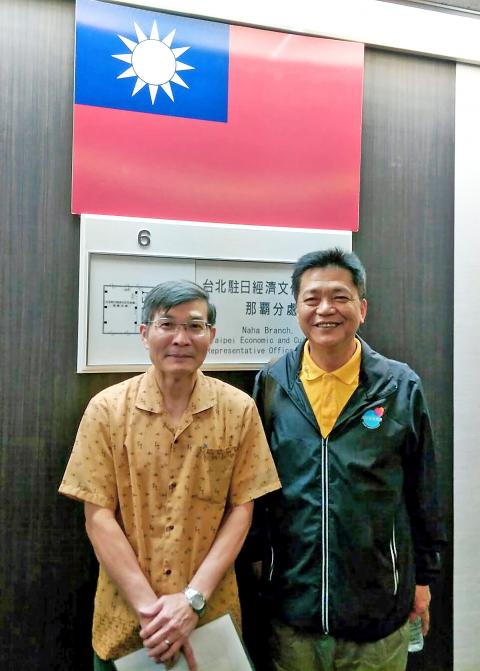Su Chii-cherng (蘇啟誠), director-general of the Osaka branch of the Taipei Economic and Cultural Office, committed suicide early yesterday at his residence, the Ministry of Foreign Affairs said, just one week after his office was accused of indifference to the plight of Taiwanese stranded in the area in the wake of Typhoon Jebi.
The ministry issued a statement expressing its deepest grief and regret over the loss of Su, 61, who assumed leadership of the office in July.
He previously served as director-general of the office’s Naha branch and as deputy secretary-general of what is now called the Taiwan-Japan Relations Association.

Photo: CNA
“Director Su was a hardworking and responsible diplomat. He had done a remarkable job during his diplomatic career and was always willing to mentor the nation’s younger diplomats,” the ministry said. “We are extremely saddened by his passing.”
The ministry said it would do everything it can to assist Su’s family and urged the public to respect their privacy.
Local media have reported that Su’s suicide was linked to work pressure, presumably caused by an outpouring of criticism due to the office’s perceived lack of assistance for Taiwanese who were affected by Jebi.
The ministry declined to comment on the allegations.
A netizen said they last week telephoned the Osaka office to ask whether it could help them find accommodation, to which a staff member allegedly responded: “How could I help you with that? Where you want to stay is your own choice.”
Criticism increased further after a false report emerged that the Chinese embassy in Japan sent tour buses to pick up Chinese tourists stuck in Osaka’s Kansai International Airport.
Minister of Foreign Affairs Joseph Wu (吳釗燮) on Wednesday said that changes are needed in the emergency response mechanism at the representative offices in Japan.
The heads of the offices were originally scheduled to meet in Osaka today to discuss ways to revise its emergency response protocols.
Representative to Japan Frank Hsieh (謝長廷) flew to Osaka after learning of Su’s suicide and issued a news release lamenting the diplomat’s death.
“People have been comparing what the Osaka office did to help tourists stranded in Kansai International Airport with what the Chinese embassy did, placing staff at the office under tremendous pressure,” Hsieh said.
Staff at the offices did their utmost to help in the wake of Jebi and a magnitude 6.6 earthquake that struck Hokkaido on Thursday last week, Hsieh said, adding that their hard work should be justly recognized.
The Presidential Office said that President Tsai Ing-wen (蔡英文) has instructed the ministry to do everything possible to assist Su’s family, and expressed sorrow and condolences over the diplomat’s death.
Additional reporting by Lin Tsuei-yi and CNA

Right-wing political scientist Laura Fernandez on Sunday won Costa Rica’s presidential election by a landslide, after promising to crack down on rising violence linked to the cocaine trade. Fernandez’s nearest rival, economist Alvaro Ramos, conceded defeat as results showed the ruling party far exceeding the threshold of 40 percent needed to avoid a runoff. With 94 percent of polling stations counted, the political heir of outgoing Costa Rican President Rodrigo Chaves had captured 48.3 percent of the vote compared with Ramos’ 33.4 percent, the Supreme Electoral Tribunal said. As soon as the first results were announced, members of Fernandez’s Sovereign People’s Party

MORE RESPONSIBILITY: Draftees would be expected to fight alongside professional soldiers, likely requiring the transformation of some training brigades into combat units The armed forces are to start incorporating new conscripts into combined arms brigades this year to enhance combat readiness, the Executive Yuan’s latest policy report said. The new policy would affect Taiwanese men entering the military for their compulsory service, which was extended to one year under reforms by then-president Tsai Ing-wen (蔡英文) in 2022. The conscripts would be trained to operate machine guns, uncrewed aerial vehicles, anti-tank guided missile launchers and Stinger air defense systems, the report said, adding that the basic training would be lengthened to eight weeks. After basic training, conscripts would be sorted into infantry battalions that would take

GROWING AMBITIONS: The scale and tempo of the operations show that the Strait has become the core theater for China to expand its security interests, the report said Chinese military aircraft incursions around Taiwan have surged nearly 15-fold over the past five years, according to a report released yesterday by the Democratic Progressive Party’s (DPP) Department of China Affairs. Sorties in the Taiwan Strait were previously irregular, totaling 380 in 2020, but have since evolved into routine operations, the report showed. “This demonstrates that the Taiwan Strait has become both the starting point and testing ground for Beijing’s expansionist ambitions,” it said. Driven by military expansionism, China is systematically pursuing actions aimed at altering the regional “status quo,” the department said, adding that Taiwan represents the most critical link in China’s

‘REALLY PROUD’: Nvidia would not be possible without Taiwan, Huang said, adding that TSMC would be increasing its capacity by 100 percent Nvidia Corp CEO Jensen Huang (黃仁勳) on Saturday praised and lightly cajoled his major Taiwanese suppliers to produce more to help power strong demand for artificial intelligence (AI), capping a visit to the country of his birth, where he has been mobbed by adoring fans at every step. Speaking at an impromptu press conference in the rain outside a Taipei restaurant, where he had hosted suppliers for a “trillion-dollar dinner,” named after the market capitalization of those firms attending, Huang said this would be another good year for business. “TSMC needs to work very hard this year because I need a lot